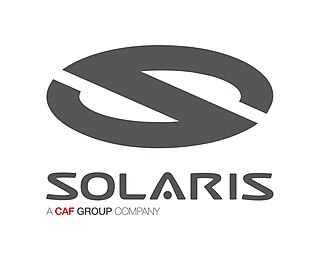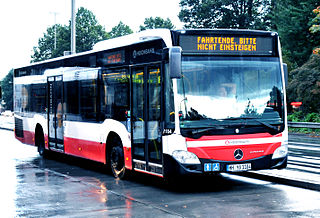
A trolleybus is an electric bus that draws power from dual overhead wires using spring-loaded trolley poles. Two wires, and two trolley poles, are required to complete the electrical circuit. This differs from a tram or streetcar, which normally uses the track as the return path, needing only one wire and one pole. They are also distinct from other kinds of electric buses, which usually rely on batteries. Power is most commonly supplied as 600-volt direct current, but there are exceptions.
North American Bus Industries, Inc. (NABI) was a manufacturer of heavy-duty transit buses with its headquarters, bus manufacturing and assembly operations, located in Anniston, Alabama. Its products ranged from 31-feet to 60-feet in length, and were sold to operators throughout the United States and Puerto Rico. NABI's U.S. operations also include an aftermarket parts division in Delaware, Ohio, and an after-sales service center at Mira Loma, California.

Solaris Bus & Coach sp z o.o. is a Polish manufacturer of public transport vehicles, with its headquarters in Bolechowo-Osiedle near Poznań. It is a subsidiary of Spanish rolling stock manufacturer CAF with a market share for electric buses in Europe of about 18%.

An articulated bus, also referred to as a slinky bus, bendy bus, tandem bus, vestibule bus, stretch bus, or an accordion bus, is an articulated vehicle, typically a motor bus or trolleybus, used in public transportation. It is usually a single-decker, and comprises two or more rigid sections linked by a pivoting joint (articulation) enclosed by protective bellows inside and outside and a cover plate on the floor. This allows a longer legal length than rigid-bodied buses, and hence a higher passenger capacity (94–120), while still allowing the bus to maneuver adequately.

A low-floor bus is a bus or trolleybus that has no steps between the ground and the floor of the bus at one or more entrances, and low floor for part or all of the passenger cabin. A bus with a partial low floor may also be referred to as a low-entry bus or seldom a flat-floor bus in some locations.

The Dennis Dart is a rear-engined single-decker midibus chassis that was introduced by Dennis of Guildford, England in 1989, replacing the Dennis Domino. Initially built as a high-floor design, in 1996 the low-floor second generation Dennis Dart SLF was launched. In 2001, production of the Dart SLF passed to TransBus International, during which time it was sold as the TransBus Dart SLF; Alexander Dennis took over production in 2004, renaming the product as the Alexander Dennis Dart SLF.

Mercedes-Benz has been producing buses since 1895 in Mannheim in Germany. Since 1995 Mercedes-Benz buses and coaches are known by the brand name of Daimler Buses, a wholly-owned subsidiary of Daimler Truck.

The Alexander ALX400 was a 2-axle double-decker bus body built by Walter Alexander Coachbuilders. It was one of the ALX-series bodywork, all of which featured the same designs on the front and rear panels that were originally designed for the new generation of mainly low-floor bus chassis produced since the late 1990s.

Gillig is an American designer and manufacturer of buses. The company headquarters, along with its manufacturing operations, is located in Livermore, California. By volume, Gillig is the second-largest transit bus manufacturer in North America. As of 2013, Gillig had an approximate 31 percent market share of the combined United States and Canadian heavy-duty transit bus manufacturing industry, based on the number of equivalent unit deliveries.

A Kassel kerb is a design of kerb that features a concave-section that allows for an easier alignment for buses. The kerb was first introduced in the German city of Kassel for the low-floor tram system but has since been adopted for use at traffic stops. Kassel kerbs can be part of a bus stop kerb, designed for low-floor buses that serve an elevated bus stop platform.

Dopravný podnik Bratislava, akciová spoločnosť is the only provider of city public transport in Bratislava. It provides 3 types of transportation:

Burgasbus is the public transit service of the city of Burgas, Bulgaria. It serves the majority of bus routes in Municipality of Burgas. It also runs to Varna, Yambol, Ruse and Elhovo.

MAN Truck & Bus SE is a subsidiary of Traton, and one of the leading international providers of commercial vehicles. Headquartered in Munich, Germany, MAN Truck & Bus produces vans in the range from 3.0 to 5.5 t gvw, trucks in the range from 7.49 to 44 t gvw, heavy goods vehicles up to 250 t road train gvw, bus-chassis, coaches, interurban coaches, and city buses. MAN Truck & Bus also produces diesel and natural-gas engines. The MAN acronym originally stood for Maschinenfabrik Augsburg-Nürnberg AG, formerly MAN AG.

SOR Libchavy is a Czech manufacturer of buses for urban, intercity and tourist traffic and trolleybuses. It was established in Libchavy in 1991.

TEDOM a.s is a Czech engineering company which was established by Ing. Josef Jeleček in Třebíč in 1991.TEDOM is an abbreviation of the Czech words TEplo DOMova. The primary scope of business of the company is the development and production of CHP units with gas combustion engines. The company's product portfolio also includes combustion engines, all of them designed by TEDOM.

TEDOM C 12 is a low-floor urban bus produced from 2006 to 2012 by the now defunct bus manufacturing division of the company TEDOM from the Czech Republic. The company ceased bus production in 2012.

TEDOM C 18 is a prototype of a full low-floor single-decker articulated bus produced by the now defunct bus manufacturing division of the company TEDOM from the Czech Republic in 2010.

TEDOM Kronos 123 is a low-floor urban bus produced from 2004 to 2006 by the now defunct bus manufacturing division of the company TEDOM from the Czech Republic. It was replaced by TEDOM C 12 in 2006.
Mellor Coachcraft, known simply as Mellor or Mellor Bus, is a British bus manufacturer based in Rochdale, Greater Manchester. Founded in the 1960s, Mellor has primarily produced bodywork for various different minibus chassis throughout its history. Mellor is owned by parent company, Woodall Nicholson Group, alongside Treka Bus.

The New Flyer Low Floor is a line of low-floor transit buses that was manufactured by New Flyer Industries between 1991 and 2014. It was available in 30-foot rigid, 35-foot rigid, 40-foot rigid, and 60-foot articulated lengths. In addition to the different available lengths, the buses were sold with a variety of prime movers, ranging from conventional diesel and CNG combustion engines to diesel-electric hybrid, gasoline hybrid, and hydrogen fuel cell.

















